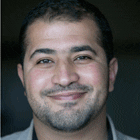Egypt tightens the screw
 Political uncertainty pushes the government to roll recent free speech gains and muzzle independent voices. Ashraf Khalil asks, will Facebook be next?
Political uncertainty pushes the government to roll recent free speech gains and muzzle independent voices. Ashraf Khalil asks, will Facebook be next?
(more…)
 Political uncertainty pushes the government to roll recent free speech gains and muzzle independent voices. Ashraf Khalil asks, will Facebook be next?
Political uncertainty pushes the government to roll recent free speech gains and muzzle independent voices. Ashraf Khalil asks, will Facebook be next?
(more…)
These are uncertain times in the Arab world’s most populous nation. President Hosni Mubarak is 82, fresh from major gall bladder surgery and in uncertain health. There’s a parliamentary election coming next month, a crucial presidential vote next year and a general sense of uncertainty about everything.
It’s an unfamiliar feeling in a country where politics is generally plodding, stage-managed and extremely predictable. The latest evidence of that uncertainty: a multi-level government push to tighten its control of information.
The past month has witnessed a number of incidents that analysts and activists say amount to a comprehensive effort to roll back limits on freedom of expression and muzzle independent voices.
First came the abrupt cancellation of two popular public affairs television talkshows, one of them featuring maverick journalist Ibrahim Eissa. Then came Eissa’s abrupt firing as editor in chief of the daily newspaper Al-Dostour. Eissa was fired by the paper’s brand new owners, just days after prophetically writing that the government would begin targeting troublesome journalists more extensively.
Blogger Baheyya, an anonymous but deeply respected commentator on the Egyptian political scene, wrote at the time that, “The regime’s goal is clear: to control the flow of political information at an exceptionally sensitive time, limiting the public’s exposure to alternative constructions of political reality.”
Eissa himself said in a television interview (in Arabic here) that the government “requires total silence” and “a return to where we were in 2004” before the explosion in independent media and the efforts of the Kefaya movement succeeded in pushing through longstanding redlines.
Within days came more government actions. The broadcast licenses of 12 satellite channels, most of them religiously themed—were cancelled. A government statement declared that the channels were guilty of “inciting religious hatred” or selling unlicensed medical products. Information minister Annas Al-Fiqi ominously described the moves as “corrective measures.”
A second government decree effectively restricted the ability of satellite news channels to do live broadcasts from the field.
Now there’s concern that the government will turn its attention to Facebook, the social networking platform that has become an effective tools for activists to connect, disseminate information and organise protests. Guests on a recent state television talk show railed against Facebook as a danger to domestic stability.
“We need to prevent problems, strikes and vandalism in the country by regulating it,” said one guest.
Commentor Ossama Diab, writing in the Guardian said, “The recent media crackdown — and the talk of ‘regulating’ Facebook in Egypt — is an indicator that the regime does not have the slightest intention of playing the political game fairly and freely.”
Ironically, the current campaign takes place at the same time that Egypt is being credited with an overall improvement in press freedom. The organisation Reporters Without Borders released its annual press freedom index, last week, moving Egypt up 16 spots to 127.
Security forces in Alexandria have arrested over 50 people hanging posters in support of the Muslim Brotherhood. The Brotherhood is banned from putting up electoral candidates but circumvents the restrictions by fielding candidates as independents. The move is even more contentious given that Alexandria is a Brotherhood stronghold. Since 9 October, when they announced they would stand in November’s parliamentary elections, about 250 Brotherhood members have been detained. An official has said the posters breached a law forbidding the use of religious slogans for election purposes. This follows Tuesday’s threat by the largest liberal opposition party to boycott the election after state television refused to air its political adverts.
Microsoft is extending its program of giving free software licences to non-profit organisations. The initiative was first applied to Russia, after it was discovered that authorities were using software piracy inquiries as a method of suppressing independent media outlets and advocacy groups. The program will now include 500,000 NGOs in Armenia, Azerbaijan, Belarus, Kazakhstan, Kyrgyzstan, Tajikistan, Turkmenistan, Uzbekistan, China, Malaysia, and Vietnam. Prior to the announcement NGOs could only obtain a free licence if they were aware of the program and followed the necessary procedure. According to Microsoft’s official blog announcement, the unilateral licence will last until 2012.